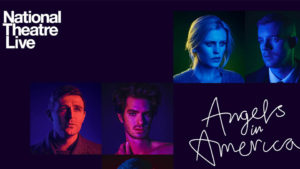
 (5 / 5)
(5 / 5)
Survival is central to the first part of Tony Kushner’s “Angels in America”. This can be seen in the consideration of the fight to survive illness and addiction but also by asking how far you would go to make a relationship survive or to survive oppression. As well as survival, themes of morality, religion and politics remain essential to the play and are used as tools for character development.
As mentioned in the pre-show interview with its director, Marianne Elliott, the play moves from domesticity to magical realism due to the hallucinations experienced by several of the characters which become more overwhelming as the play progresses.
Rooted in 1985 New York during the AIDS epidemic, the harsh reality of each character’s situation is evident and is kept in mind through the use of three side-by-side mini sets so even as the play moves from one character to another, their set remains darkened but still visible. The neon lights bordering each set give an almost magical aura but initially act as barriers between characters before falling away and allowing characters to cross them.
The entire cast give incredible performances that portray characters vividly and in a way so that no matter their moral or political stance the audience still builds a connection with them. However two actors in particular captivate the audience, Denise Gough as Harper Pitt, a Valium addicted Mormon housewife, and Andrew Garfield as Prior Walter, a charismatic AIDS sufferer. Both characters act as bridges between fantasy and reality and their one scene together was charming and captured the attention and imagination of the entire audience.
As a whole, Angels in America is a stunning political portrait that remains extremely relevant today due to its discussions of American politics and the changing identity of America. It is an emotional roller-coaster that will keep you on the edge of your seat and I will definitely be seeing the second part.
National Theatre Live: Angels in America
Part 1:Millennium Approaches
20th July 2017
Gwyn Hall, Neath
Running time: 3 hours 40 minutes with two 15-minute intervals
Author: Tony Kushner
Director: Marianne Elliott
Design: Ian MacNeil (Set Designer), Nicky Gillibrand (Costume Designer), Paule Constable(Lighting Designer), Robby Graham (Choreographer and Movement), Adrian Sutton (Music), Ian Dickinson (Sound Designer), Finn Caldwell (Puppetry Director and Movement), Finn Caldwell and Nick Barnes (Puppet Designers), Chris Fisher (Illusions), Gwen Hales (Aerial Director), Harry Mackrill (Associate Director), Miranda Cromwell (Staff Director)
Cast: Susan Brown, Andrew Garfield, Denise Gough, Nathan Lane, Amanda Lawrence, James McArdle, Nathan Stewart-Jarrett, Russell Tovey, Stuart Angell, Laura Caldow, Claire Lambert, Becky Namgauds, Stan West, Lewis Wilkins
Category Archives: Theatre
Review: Stories For The Silver Tree by Sian Thomas
![]()
The Cardiff Fringe Theatre Festival has been the host of three events (this included) that I’ve been to recently, and each of them have all been astoundingly wonderful. Though the festival ends tomorrow, I look forward to its (hopeful) return. I hope it does return, I very sincerely do. I’ve had an incredible time, and seen some doubly incredible things.
Stories For The Silver Tree was one of these incredible things. I went in totally blind (I knew there was a trailer but elected not to watch it – I’ve always liked to go into theatre blind, I’ve found it makes me more open to plots and characters if I don’t look them up first).
The concept of this showing was amazing. I thought it was going to be a play. Like, a traditional, people-play-the-characters play. But it wasn’t. And I think it was better.
Instead of this, it was Tamar Williams and Darius Nash narrating and telling the audience (and singing, too – which was really good and something I enjoyed very much) the story of the main character (Bran). They also used clever sound technology which I’ve never heard of or probably could understand the mechanics of but, at face-value (which is how I tend to take things): It was very impressive and amazing. Using sounds from the audience or from props put on a loop right there and then during the performance to put more depth into a scene is something I’ve not seen before – and I loved it so much. Although, at the mention of audience participation, I did get nervous – but it turned out brilliantly.
The story was also so atmospheric. From the brainy sound tech, yes, but from the writing and the deliverance, I think for the last few hours I’ve been somewhere else; lost in pretty words and lovely scenery up in my head. That’s irreplaceable to me. I love and have always loved things that can make me feel like this. One phrase that stuck out to me was, “the turquoise of evening and the navy of night”. These words just fit together so nicely, and they were delivered so wonderfully (that made me remember them! Although I’m not sure I’ve got the direct quote right) that it made my experience of Bran’s story so much more meaningful.
I don’t know! It was very cute. And folk-y. And magical. And I just loved that all of that was wrapped up together and given to me as an innovative story, rather than a traditional play.
Although the festival ends tomorrow, and I am sad to watch it go, as today was my last day to experience it, there is another showing of Stories For The Silver Tree tomorrow, which I wholeheartedly recommend seeing! http://www.cardifffringetheatrefestival.co.uk/events-list/2017/7/22/stories-for-the-silver-tree. Which is why I gave it 5 stars! It was delightful.
Also, more could be found at the Twitter pages of the performers: https://twitter.com/darius_nash , https://twitter.com/tamareluned.
Chippy And Scratch Does the Diff- Chippy Lane Productions
Chippy And Scratch Does the Diff
Following their sell-out night at the London Welsh Centre last month, Chippy Lane Productions brought (half) their 2017 scratch night home to the ‘Diff. Following an audience vote on the night 4 of the 8 pieces were selected for performance in Chapter.
As these are works in progress this isn’t a strict review, but a chance to reflect on the pieces presented and share some comments on these great new writers as well as the talented young directors and actors.
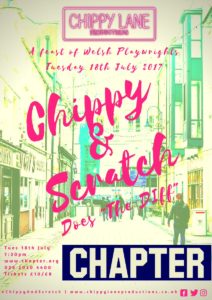
You Gotta Go There to Come Back – Poppy Corbett
The story of the Welsh girl desperate to leave Wales- and the slim pickings of Metros – definitely struck a chord with most of the room, both in London and back in Cardiff. We’ve all heard the same Welsh jokes when living and working over the border, and we’ve all felt the push and pull of family, opportunity and the big question of ‘what if?’ that lies with leaving where you’re from. Filled with references that anyone who grew up in South Wales will certainly recognise but also full of heart and a universal story about leaving behind the familiar. The ten minute extract of Corbett’s longer piece was brilliantly funny- particularly thanks to Michelle Luther’s energetic engaging performance- but also highly poignant and touching. The story of the conflict between roots and dreams, about the importance of where we come from but our own independence is one that will resonate with audiences universally, however the ‘home touches’ of growing up Welsh gave it a particularly poignant feel. More importantly Catrin is a character a lot of women will identify with, and giving voices to women’s stories and women’s experiences on stage is a vital one. Corbett has a real voice for capturing that experience and it’s one that should be heard.
Tiny Mad Animals- Neil Bebber
Any story that combines a debate about lasers with tea drinking is worth anybody’s time. Neil Bebber has also managed to come up with the greatest description of children with that title. ‘Tiny Mad Animals’ sees a pair of old friends and flatmates reflecting on past and future as one of them prepares to move in with his girlfriend. There’s an easy but witty dialogue between the two characters and it’s easy to imagine their long friendship (and nights spent stoned, chasing each other around the flat talking about lasers). But there’s also a real sweetness to their story, and a sensitivity with which Bebber’s writing addresses their feelings for one another. It’s a piece that really left a question mark over what might happen next.
Outside Blisters- Ruth Majeed
Blisters of the title is a nightclub in Bargoed, and this piece forms part of several short plays Majeed is putting together to reflect contemporary Valley’s life. Anyone who has lived or worked in that part of the world will immediately feel like they know these characters. And even if you’re a generation or two apart from the selfie-taking e-cigarette smoking girls in the play, their world is still familiar. It’s a great take on contemporary life, the language the girls speak in is pitch perfect Valleys and really brings the vibrancy of their world to life. It’s a genuinely funny but also very real slice of life and shows how a simple moment- three girl having a smoke outside a club, can be a real window into so much more. Again these are voices we hear rarely- both women, and women from working-class backgrounds, outside major cities. Majeed in this extract and her wider piece is bringing these stories to audiences, and showing both the uniqueness of that particular slice of life, and the universal elements of their stories. At the same time it’s a brilliantly funny piece of writing that will have most audiences either saying ‘I know that girl’ or ‘I am that girl’.
Cardiff Boy- Kevin Jones
If ‘Outside Blisters’ captures a slice of the current generation, ‘Cardiff Boy’ spoke to another generation in the room- the 90s kids. No sooner had R Kelly blasted out while Jack Hammett described a night out in Lloyds, than every person of a particular age could smell 90s Cardiff in an instant. The clever use of musical cues to divide up aspects of the story, as well as the nostalgia they induce was a great framing device for this look back at life growing up in Cardiff. Nostalgia aside it felt like there was a lot to say about Cardiff in the 90s through the eyes of a young working-class man. Not just the wider stories of the city shaping him, but the challenges and struggles within in that time from teenager to adult. Hammatt brought to life a fascinating slice of life in the short extract. A combination of detailed knowledge of the subject- niche references to Cardiff itself but a broader sense of working class life for teenagers in the 90s, makes this a great piece for locals and others alike. Underneath the music and the nostalgia there’s also an important story of masculinity, working class life and growing up that is an important and interesting story to explore. Jack Hammett brought to life the story with engaging and endearing charm and it’s a play and a performance that hopefully will continue to grow.
Following the success of the 2017 London scratch night, these 4 pieces were a brilliant ‘homecoming’ for Chippy Lane productions. Their support of new writers in the short time they’ve been a company (just 16 months) is a marker of commitment to supporting new artists in Wales, and these scratch nights have been a great opporturnity to see that work both in London and on ‘home’ turf.
Chipppy Lane Productions can be found at:
@chippylanprod
www.chippylaneproductions.co.uk
An interview with Catherine Paskell, Artistic Director, Dirty Protest.
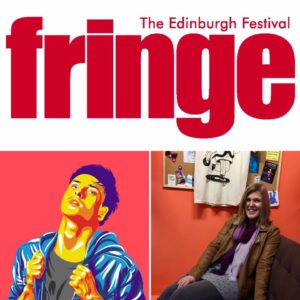
Hi pleased to meet you. Can you please give our readers some background information on yourself and your role in the arts in Wales?
I’m Catherine and I’m the Artistic Director of new writing company Dirty Protest. I’m directing SUGAR BABY by Alan Harris, which Dirty Protest is taking to Paines Plough’s ROUNDABOUT @ Summerhall venue with Wales in Edinburgh this summer. I was a founding creative associate of National Theatre Wales – it was this opportunity that brought me back to Wales. I love what I do and connecting to people with theatre making in Wales.
https://edinburghfestival.list.co.uk/event/778434-sugar-baby/
Can you tell us about the work your company is taking to this Edinburgh Festival Fringe?
SUGAR BABY is a new one-man comedy drama, about a young lad from Fairwater, in Cardiff, called Marc. Marc is trying to borrow £6,000 from a local loan shark, help out his old man, save a girl and survive the day. It’s very funny. Alan’s got an exceptional voice for these Welsh characters, the stories and details pull you in, and you are rooting for Marc the whole way. The cast is one man: Alex Griffin-Griffiths, he’s a graduate of RWCMD and he’s brilliant. It’s a lot of fun to work on together and we are previewing the play in Chapter at the end of July. Chapter are fantastic supporters, their help means that anyone who can’t make it to see the show in Edinburgh can come and see the previews in Cardiff, and help us to develop the play before we head up.
How is work selected to go to the festival?
We want to showcase the best of Welsh new writing, from a writer living in Wales. Alan’s writing is exceptional, and we wanted a play that was uniquely Welsh but that wasn’t stereotypical in its exploration of a lived Welsh life. We chose Sugar Baby because it’s authentic, and an antidote to all the poverty porn plays and TV programmes that we have seen lately. Sugar Baby is a Welsh play at an international-looking Fringe Festival, and will stand alongside some of the best theatre in the world.
Wales Arts International who have funded some of the companies this year state,
“The idea is to help the selected Welsh companies to present their work at the Fringe in the best possible way – with the best conditions – and, importantly, to connect with international promoters and programmers participating in the British Council Edinburgh Showcase.”
Why is their support important along with Arts Council Wales and British Council Wales?
We couldn’t go to Edinburgh without this support. It’s vital for our company growth and to get the best new writing out of Wales. We took Dirty Protest’s production of LAST CHRISTMAS by Matthew Bulgo to Edinburgh Festival Fringe in 2014, supported with Wales in Edinburgh funding. That whole experience was very successful for Dirty Protest. Producers, theatre programmers and promoters from across the world came to see our play and booked it for their venues. We produced LAST CHRISTMAS in the Soho Theatre in London and the Traverse Theatre in Edinburgh. We also had many more conversations about other projects, that are now starting to come to fruition. This happened with the support of Wales in Edinburgh. Dirty Protest is a project-funded company, and usually the grants we receive only allow a maximum 15% of a project to happen outside Wales. For us to build our company, we have to stand on a more prominent stage. It’s difficult to get reviewers and promoters outside Wales to see our work when we perform at home. Going to such a high-profile festival as Edinburgh Fringe has benefits for us, for the artists making work here and for the promotion of Wales’ arts.
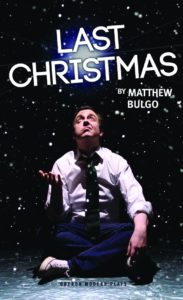
The festival features a huge range of productions and there is great deal of competition for audiences, why should audiences come and see your companies work?
It’s a proper laugh – you’ll leave and have had a really good time for less than an hour, so you’ll have loads of time to walk to your next show without having to rush! SUGAR BABY is part of an incredible programme in an amazing venue. There’s something really exciting about being in that environment, watching an excellent actor as you are pulled along this funny and edgy Cardiff story. All that matters is the writing, acting and the relationship between performer and audience. It’s the ultimate live event!
Welsh artists/Companies will be showcasing a range of art forms including theatre, new writing, site-specific work and contemporary dance. In your opinion is there anything that is distinctly Welsh which links them?
What links the artists and companies is a distinct camaraderie. We are a collective who are representing Wales and are proud of presenting our world-class work together. We are all there to help each other out, to bring each other up, and that is something special about the Welsh arts scene. The diversity of art form in the WIE showcase shows that this community belongs to everyone, whether they are into well-made new plays, live art, contemporary dance, reimagined classics – and this needs to be reflected not just in Edinburgh, but in Wales throughout the rest of the year.
What would you recommend seeing from the other Welsh/Wales based companies going to this year’s festival or perhaps the festival as a whole?
I loved F.E.A.R., the one-man show created by Mr and Mrs Clark and performed by Gareth Clark when I saw it earlier this year. I don’t want to spoil it for anyone who’s going to see it, but there are so many joyful and beautiful and thought provoking moments in the performance. I’ve heard a lot about Revlon Girl, the cast are awesome and I have a huge love for Pontardawe Arts Centre, so I’ll be seeing that. I thought A Regular Little Houdini was great at the Fringe, so I want to see Flying Bridge and Daniel Llewellyn-Willians’ next show, Not About Heroes. I can’t wait to see Seagulls, especially because Volcano who are making it have a whole venue in Leith we can hang out in! I haven’t yet seen all the shows this year, so I’m looking forward to seeing all the productions in the WIE showcase. For the festival as a whole, I’m mainly looking for new, young companies, actors, playwrights and comedy writers. Every year at the Fringe, I discover artists who I know I’ll be looking out for in the years to come. This year, I’ll be checking out FRED AND ROSE in Venue 13. The show is by a group of USW Atrium drama graduates, who are going to Edinburgh for the first time and it looks great contemporary theatre piece. I’ll be watching a lot of comedy too. I’m excited by Tom Neenan’s ATTENBOROUGH, Tom’s a great character comic. His show last year was a about a haunted old vaudeville theatre and it was great comedy storytelling. And who doesn’t love David Attenborough?! Also, the brilliant Jordan Brookes’ newest comedy show on the Free Fringe is him talking about his nan; last year, I saw him re-enact his own birth. This guy is surreal and excellent. And if you missed it last year, my favourite show of the Fringe in 2016 was the Free Fringe comedy, Richard Gadd’s Monkey See Monkey Do. It was exceptionally funny but also hugely brave and just incredible. The show won the Edinburgh Comedy Award last year and is back, this time at Summerhall, just for a limited run.
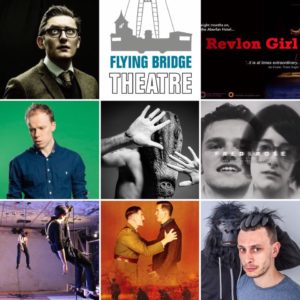
What do the artists and companies do when they aren’t performing?
We watch other artists’ shows, we see people we haven’t seen since last year, we support each other and meet promoters and venue programmers to get the show on again after the Fringe. Edinburgh is a bit of a bubble, so you try and maintain some perspective and remember there is a world outside the city. I always go to the art galleries and museums in Edinburgh because they are chilled spaces with wonderful exhibitions during August. They open my mind and give me space away from the buzz of the festival. Last year, I went to the Harry Benson photography exhibition in the Scottish Parliament and was in there for 4 hours.
What’s the best Fringe show you’ve ever seen?
I’ve visited the Fringe, as an artist and a punter every year except one for the past 17 years. The Fringe show that sticks with me through that whole time is VICTORY AT THE DIRT PALACE by Adriano Shaplin and the American theatre company, the Riot Group. I saw it in 2002. It was an intense, satirical play, in a tiny performance space that wasn’t one of the big commercial venues. It was about the post-September ’11 American mindset. 9/11 had only happened less than a year ago; the writing was sharp, funny and urgent. The details acutely observed. The ensemble of four were witty and clear. As an emerging artist, about to leave the UK for training in America, I knew that was theatre I aspired to make.
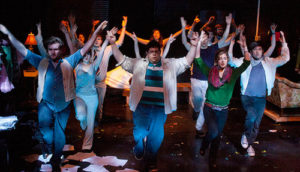
Thanks for your time Catherine.
Adolygiad: Deffro’r Gwanwyn, (The Gate/Canolfan Berfformio Cymru) gan Miriam Elin Jones
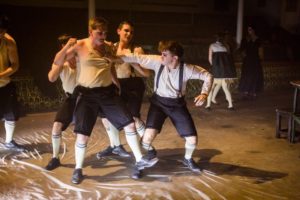
Yn ddiweddar, mae’n bur anodd credu – gyda phob sgwrs yn bob man yn troi o’i amgylch – bod unrhyw un yn gallu gadael eu ffics nosweithiol o Love Island a dianc i’r theatr. Fodd bynnag, nos Wener ddiwethaf, llenwyd seti The Gate gan gynulleidfa yn mynychu perfformiad olaf myfyrwyr BA Perfformio Prifysgol y Drindod Dewi Sant, Deffro’r Gwanwyn.
Mewn oes lle nad oes yna’r un weithred rywiol yn dabŵ a cham-drin rhywiol yn jôc ar enau Arlywydd America, pendronais sut ymateb byddai gan sioe gerdd yn trin a thrafod gormes rhywiol a chulni crefyddol? Dan arweiniad y gyfarwyddwraig Angharad Lee, aeth y cast talentog ati i daclo themâu heriol y ddrama, gan osod eu stamp eu hunain ar gyfieithiad medrus Dafydd James.
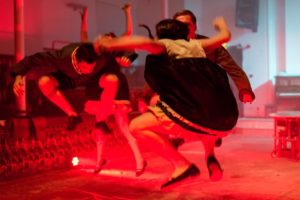
Dilyna stori’r ddrama hynt a helynt cymuned o laslanciau a glaslancesi, eu hormonau’n rhemp a’r rhieni ac athrawon o’u hamgylch yn gwrthod cydnabod eu teimladau na’u dyheadau nwydus. Cyflwynir Wendla a Moritz – y naill methu deall o ble ddaw babis a’r llall â pharchedig ofn ei freuddwydion melys gyda’r nos – a Melchior y rebel sy’n eu harwain ar gyfeiliorn, yn pwysleisio normalrwydd eu dyheadau. Heb draethu rhyw ormod am y plot, dysgir yn fuan iawn nad melys pob anwybod wedi’r cwbl.
Roedd awyrgylch Canolfan The Gate yn gweddu’n rhyfeddol i’r sioe gerdd arbennig hon. Mewn hen eglwys Bresbyteraidd wedi ei haddasu’n theatr, gosodwyd set syml ond symudol – pedwar bwrdd a stolion – a llenwyd y gofod gyda pherfformiadau a choreograffi egnïol. Wrth fynd i eistedd ar un o’r meinciau pren (a brofodd yn briodol o anghyfforddus) roedd yr actorion yn chwarae plant yn ddiniwed braf ar lawr. O’n hamgylch, roedd pileri addurniadol yn britho’r lle, rhai ag ysgydwyd i’w craidd yn ystod rhai o uchafbwyntiau dramatig y cynhyrchiad, ac yn lle pregethwr mewn pwlpid, gosodwyd y band, wedi’i godi i le haeddiannol ar dir uwch. Er ehangder yr ystafell, roedd hi’n eithriadol o gynnes, ac o ystyried gwres y caru tanbaid sy’n rhan mor ganolog o’r sioe, bosib bod hynny’n fwriadol – ond roeddwn ni’r gynulleidfa a’r cast i gyd yn chwys drabwd erbyn diwedd y sioe.
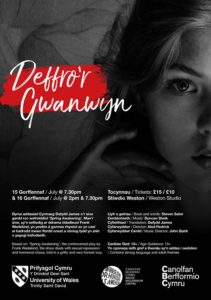
Heb os, roedd carisma cynnil rhwng bob un o’r cast yn dystiolaeth i’w hagosatrwydd a’r cyd-weithio cyson sydd wedi bod yn rhan mor greiddiol o’u cwrs. Golyga natur y sioe bod pob un yn cael cyfle i fynnu llwyfan, a nifer o’r cymeriadau ymylol yn cael cyfle i gamu i’r goleuni. Roedd dicter Martha (Heledd Roberts) i’w deimlo a solo Lloyd Macey fel Otto (serch lletchwithdod ei daldra’n golygu nad oedd yn argyhoeddi fel disgybl ysgol) yn un i’w chofio. O ran y prif gymeriadau, roedd Jemima Nicholas fel Wendla yn serennu, gyda’i holl osgo a’i llais yn efelychu chwilfrydedd diniwed a drygioni merchetaidd ei chymeriad drwyddi draw. Er bod Josh Morgan fel Melchior a hithau yn argyhoeddi fel cariadon ifanc, tueddai i’w lais ef foddi dan sŵn y gerddoriaeth, ac nid oedd mân broblemau technegol o ran y sain yn hwyluso pethau iddo chwaith. Yn goron ar y perfformiadau oll, roedd ymdriniaeth Siôn Emlyn Parry o gymeriad Moritz – yn enwedig ar ddechrau’r Ail Act. Llwyddodd i yrru ias i lawr fy nghefn wrth i’w wewyr meddwl ddatblygu’n raddol, gan ddenu’r dagrau yn ystod ei olygfa olaf.
Wrth i’r ddrama fynd yn ei blaen, diosgwyd siacedi stiff a choleri hirion, Piwritanaidd y llanciau, ond aros gwnaeth y mascara wedi staenio’n drwch dros eu llygaid. Pranciai’r merched ar hyd y llwyfan yn ei ffrogiau llac, gyda’u sanau hirion yn sidet ond yn seductive ar yr un pryd, pob un yn ddoli fregus, hyd yn oed Isle herfeiddiol (Lleucu Gwawr) wrth geisio hudo Moritz. Ynghyd â’r gwisgoedd, gwnaethpwyd yn siŵr fod y llwyfan wrth i’r coreograffi’n ferw o weithgareddau rhywiol, awgrymog gyfleu’r byd newydd y deisyfa’r cymeriadau. Yr unig fai oedd i’r coreograffi ar adegau olygu bod y perfformwyr yn troi cefn ar eu cynulleidfa yn ystod y sioe. Fodd bynnag, ni phechwyd yr un ohonom. Roedd cymeradwyaeth parod wrth gwt y rhan fwyaf o’r caneuon yn dyst i’n mwynhad o’r sioe.
Gyda’r gynulleidfa gyfan ar ei thraed ar ddiwedd y perfformiad, gallaf ddatgan yn bendant na chafodd neb gyfle i ddifaru colli pennod nos Wener o Love Island yn ystod Deffro’r Gwanwyn. Er mai noson olaf eu cwrs dwy flynedd oedd y cynhyrchiad egniol hwn, dyma godi’r llen ar yrfaoedd disglair i nifer o’r cast, sy’n argyhoeddi’n gyffrous iawn i’r diwydiant theatr yng Nghymru, a thu hwnt.
Review Where Do Little Birds Go?- No Boundaries Theatre by Emily Garside
Where Do Little Birds Go?- No Boundaries Theatre, Cardiff Fringe Festival
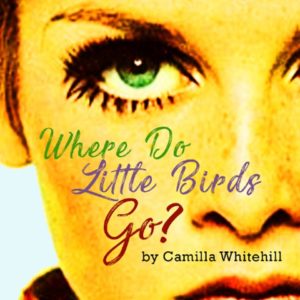
 (4 / 5)
(4 / 5)
The lesser known stories of history are generally the more interesting ones. In this case the story of a woman embroiled in the work and the legend of the Kray Twins is a fascinating one. In the story of the Kray Twins, the chapter on East End gangster Frank Mitchell – also known as the Mad Axeman- being broken out of prison, and later killed at the hands of the Krays, is well known. Liza Prescott often features as barely a footnote in this story. She was 18 and kidnapped by the Krays as a ‘companion’ to Mitchell while they held him in a East End flat. Later a witness in their trial this young woman’s story has become an almost forgotten part of the Men’s narrative.
Camilla Whitehill gives the re-named Lucy a voice in ‘Where Do Little Birds Go?’. And the use of ‘voice’ through song is a brilliantly executed device in the play. The title reference to a song made famous by Barbara Windsor grounds Lucy in the East End girl trying to make good- having travelled to London she is trying to make it as an actress, while working as a barmaid, and then a nightclub host. Music becomes an extension of Lucy’s voice, from ‘Bobby’s Girl’ welcoming the audience to her while snippets of other songs from the 50s and 60s interject, reflecting Lucy’s mood, or her dreams. Music, or lack of it when she violently shuts off the record player drive the piece forward as well as giving a real sense of time and place through the music of the era.
The men in the story are peripheral, it’s Lucy’s voice we hear. Men feature in influencing her story- the useless boyfriend she bites, then leaves, the landlord and club owners that turn a blind eye to her age, her kind Uncle Frank and of course The Krays. But in telling the familiar tale of East End life, and Gangster dealings from the point of view of a young girl who happened to witness it, gives it a new, even more harrowing spin. The final moments where she recounts begging not to speak in court, and of her resignation to being at the job that brought her to the mercy of the Krays to begin with, speak volumes about the way women find themselves caught up and spat out again by both the men in their lives, and the justice system. More importantly history tells us what happens to the men in these stories, we know next to nothing about Lucy.
Despite the dark subject matter, it is an energetic and engaging piece of writing, filled with great humour. Capturing the youthful exuberance of Lucy, Kate Elis welcomes her audience in from the very first- as she sits at her make up table singing- we’re drawn into her world. Engaging with audiences in close proximity is never easy, but Elis worked the space and the audience effortlessly, making it feel like we were individually being told the story by a friend in their living room. It takes a lot to hold an audience single headedly but Elis’ likeable enthusiastic demeanour brings in an audience, until we then see her vulnerability as Lucy’s story unfolds.
It’s an uncomfortable watch at times. As the story darkens and Lucy is held captive by the Krays, the fear about her fate, and a brutal honesty about what that experience would have been like make for difficult viewing, particularly for the women in the audience. A clever combination of movement and dialogue play out the sexual assault Lucy was subjected to and it’s a necessary, but deeply uncomfortable and upsetting sequence to watch. Elis demonstrates her intelligence as a performer that the combination of vulnerability but also the mask of self-preservation that Lucy needed to retain are conveyed perfectly. Meanwhile it’s a tribute to Luke Hereford’s sensitive, and intelligent directing that this element of the story is handled without restraint, but with sensitivity. It is of course Elis that is drives the whole piece, a true tour de force performance going from youthful exuberance to a woman broken down but still defiant by the close.
The production, as part of Cardiff Fringe, is given an excellent opportunity to make use of the performance space giving the piece an almost site-specific feel. The bunker of Little Man Coffee is both cosy enough to feel, with the ramshackle selection of seating, like we are in Lucy’s bedroom. And later, claustrophobic enough to feel like the dingy East End flat she’s kept in. Most alarmingly ‘the vault’ has an old vault door-thick metal like a safe, and a barred door like a cell in front. So, when Kate Elis pushes the door closed at the start of the performance we feel as if we’ve been brought into that world, trapped by the Krays with her. When later she fights against the door, banging the steel grill backwards and forwards the sound in the small room was deafening and the sense of being trapped very real. This element of using unconventional performance spaces really shows in this piece the effectiveness of location for performance. Another layer director Luke Hereford can add to an already brilliantly executed piece.
‘Where Do Little Birds Go’ is an important and fascinating piece of writing. Giving voice to the women on the side-lines of history is a vital part of storytelling. Even more so giving voice to women to perform their own stories, is equally vital particularly in theatre. Camilla Whitehall’s play is handled with grace and given the status it deserves by Hereford and the team. In Elis they have found a performer with a real voice and presence for Whitehall’s writing. Cardiff Fringe/No Boundaries was the Welsh Premiere for this piece and it deserves, particularly with this team, a longer, further reaching life.
Cardiff Fringe Festival runs from 15th- 22nd July in various venues across Cardiff:
http://www.cardifffringetheatrefestival.co.uk/
Collaborating with Motherlode, RCT Theatres and Taking Flight Theatre Company to develop a Welsh Critical Network.
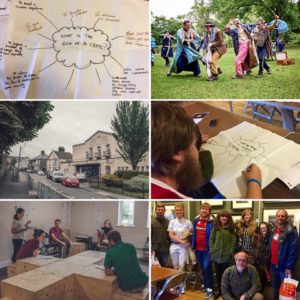
Get the Chance has collaborated with Motherlode, RCT Theatres and Taking Flight Theatre Company to run a series of free ‘Get the Chance to be a theatre critic’ workshops, participants also accessed the rehearsal process and public performances. Get the Chance was able to run this activity with the support of partners and through funding from Arts Council Wales Sharing Together. “A strategic initiative to encourage the development of networking opportunities.”

During this activity a free workshop took place at The Coliseum Theatre in Aberdare. During the workshop we discussed the role of the critic, differing methods of giving critical feedback and the role of the press and marketing department. Those attending were strong advocates for arts venues and cultural provision in general.
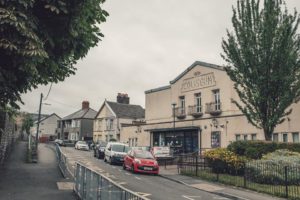
After the workshop we spent time in the rehearsal room with Motherlode who were developing their new production, ‘Exodus’. This gave us a unique insight into the development of the companies work.
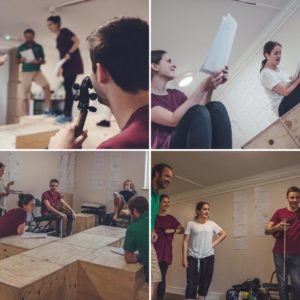
The workshop participants are all excellent examples of Creative Citizens. Get the Chance is developing a socially engaged, democratic audience development model called Creative Citizens Cymru. Many of the fundamental principles of this model are very similar to the principal goals of the Well-being of Future Generations (Wales) Act.
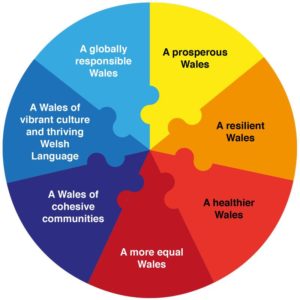
You can read a write-up of the workshop by Vicky Lord at the link below.
http://vickylord.com/2017/06/30/get-the-chance-workshop-write-up/
Get the Chance works in collaboration with a range of individual creatives, companies and organisations in order to achieve our aim of “Creating opportunities for a diverse range of people to experience and respond to sport, arts, culture and live events.” We would like to thank Rachel Boulton, Artistic Director, Motherlode and Nia Wyn Skyrme- Freelance Producer/ Promoter for their statements of support relating to this activity below.
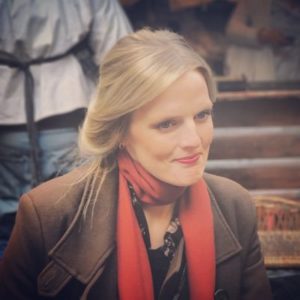
“Motherlode is all about removing barriers to theatre, making entertaining work with a political edge that our friends, neighbours and families can enjoy in a collective experience. In a quick survey we asked 100 women in Wales “Does theatre represent your world view?” 13% said yes, the other half said no, and the other half said they don’t go to the theatre. While this research needs more fleshing out, there’s a problem here with who we’re currently making theatre for and who we’re making it with…Get The Chance is vital to shifting how we talk about theatre, who gets to talk about theatre, and who decides what should be on our stages. It encourages local people to take ownership of their venues and creates a safe environment where communities can take risks and express themselves through sports, culture and live events, regardless of background.”
Rachel Boulton, Artistic Director, Motherlode
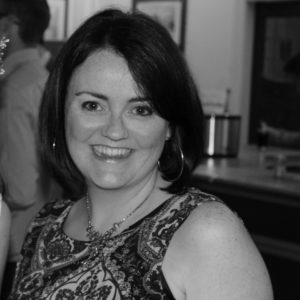
“I have been working as a freelance producer for over a year, and I have worked with Get the Chance with almost all the productions I’ve been involved with, as we share a passion for co-working, sharing ideas and contacts and creating active creative citizens in different communities across Wales.
It’s been very valuable working with an organisation like Get the Chance. Arranging reviewers, interviews and specific workshops raising the company’s profile and excellent promotion, sharing ideas and giving advice. Get the Chance have also brokered relationships with their members to become Local Promoters in different areas across Wales.”
Nia Wyn Skyrme- Freelance Producer/ Promoter
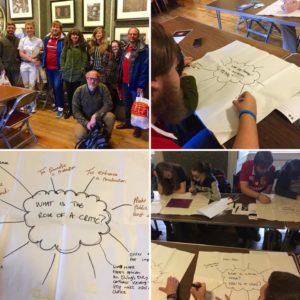
We have also recently ran a workshop in collaboration with Taking Flight Theatre Company. We ran a free ‘Get the Chance to be a theatre critic workshop’ on July the 11th at Cyfarthfa Museum. The workshop was attended by a youth group from Merthyr Tydfil. We discussed a range of areas of cultural provision and the participants then went to see Taking Flights production of The Tempest. Their reviews will follow soon!
Thanks to Beth House, Creative Producer, Taking Flight Theatre Company for supporting this activity.

“Collaborating with Get The Chance has been really exciting for us and I feel like we are only just beginning to scratch the surface of what might be possible in terms of working together and developing new arts professionals- and moreover broadening audiences. Thus far, we have been able to tap into groups who have traditionally been excluded from training as well as arts opportunities, often because of access requirements or other barriers. The work I have seen Guy do has inspired groups to think critically about the arts they consume and to want more. We are extremely hopeful that we can seek new ways to go even further with this partnership. More joined up working like this is definitely needed in Wales!”
Beth House, Creative Producer, Taking Flight Theatre Company
Review Black Mountain, Paines Plough, Theatr Clwyd by Bethany McAulay

 (4 / 5)
(4 / 5)
The Roundabout Theatre is small – and though I initially appreciated the intimacy of the compact audience, as soon as the lights dimmed, I began to experience intense claustrophobia. This, I believe, was intentional on behalf of the production team, who succeeded tremendously in their apparent attempt at creating an almost Artaudian production. I cannot distinguish a moment in which I was not on edge, or physically quivering, for the relentless mystery of the play. Certainly, Brad Birch’s ‘Black Mountain’ is the most refreshingly original, and impressively sinister play that I have ever witnessed.
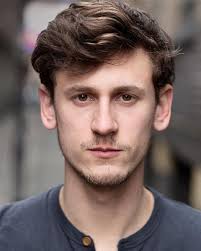
Hasan Dixon portrayed Paul with an extraordinarily potent, compelling, and convincing performance; so much so that one may mistake his acting for genuine fear and frustration. This, naturally, only strengthened the air of threat that seemed to consume the theatre as effectively as the lingering clouds of mist (which, equally, were outstandingly atmospheric). His portrayal was, above all, believable – and that is predominantly what allowed for the exponentially threatening atmosphere that left me feeling equally as terrified as Paul himself.
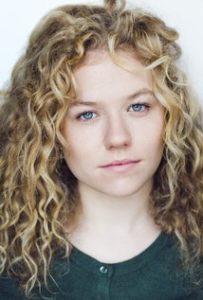
Sally Messham as Helen was extremely well played, and though the actress’ characterisation of the character was beyond satisfactory, the character itself was difficult to understand. Helen’s flaws seemed to be ingrained not in Messham’s performance, but in the script itself, as a character who was initially presented as understanding and concerned for Paul’s wellbeing, abruptly became depraved and psychopathic; which seemed too unrealistic, even for this play
In point of fact, I found that the script lacked substance. Most of the action and thrill derived largely from the physicality and manner of the actors, as well as the technical and atmospheric devices employed. I believe that, had I not viewed this play in the intimacy of the round, and thus felt so closely involved within the performance, the dialogue would not have been sufficiently strong or theatrical enough to create much tension at all.
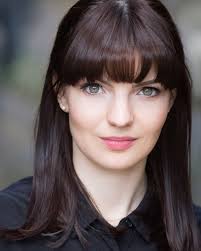
For a large part of the play, Katie Elin-Salt’s portrayal of Rebecca was almost frustratingly unconvincing, and was mostly comprised of repetitive gestures and an unchanging tone of voice. In contrast to Dixon’s consistently adaptable tone and manner, Elin-Salt’s performance did not appear to vary much at all, and became very unstimulating, very quickly. However, I began to understand the characterisation only in the final moments of the play, when Rebecca’s soullessness became intensely ominous, and I started to truly appreciate the darkness of the character. I truly regret that this was only prominent within the final ten minutes.
Although the set itself was essentially non-existent, the production was impressively and ingeniously staged, and though techniques such as sudden descents into darkness were frequently adopted, i was equally as stupefied by the final burst or strobe of glaring light than I was by the first. My feelings of paranoia and entrapment were prominent and consistent throughout the entire performance (though this was certainly not unpleasant – I acknowledged and appreciated the psychological thrill). Additionally, the employment of a single torch on stage whilst the remainder of the theatre remained in absolute darkness, as well as the frequent ear-splitting screams, were profoundly, and intriguingly, effective. Equally, the tension was enhanced tremendously during the moment in which Elin-Salt and Messham disappeared from audience view and ran frantically around the exterior of the seating area. Particularly during this moment, their menace felt like a personal threat.
‘Black Mountain’ was so consistently immersive, and felt so isolated from the world outside the theatre, I had to remind myself on numerous occasions throughout that it was merely a performance.
https://www.theatrclwyd.com/en/whats-on/black-mountain/
Review, Black Mountain, Roundabout Theatre at Theatr Clwyd by Gareth Williams
 (4 / 5)
(4 / 5)
Welcome to Roundabout. This unique pop-up theatre is taking the UK by storm. It is a masterful piece of engineering. Fully transportable, it is popping up in the most unlikely of places, including car parks, churchyards, seafronts, and housing estates. It takes six people about a day to construct, and needs nothing more than an Allen key to assemble. It is innovative, ingenious and distinctive. Its round white body is certainly noticeable alongside Theatr Clwyd, its current resting place. To have the opportunity to watch a play inside this intriguing structure was a very thrilling prospect.
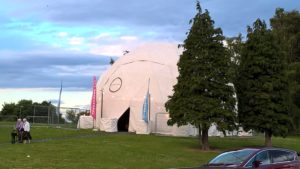
The early signs were less than promising. Walking in, I could hardly see where I was going. The darkness was overwhelming. The theatre itself wasn’t much better. It was like entering a poorly-lit spaceship. I’d wandered onto the set of an early Doctor Who. I’d been transported back to the age of the 1950s B-movie. The media images seen beforehand only compounded matters further. It was a lot smaller than the press photos had made out. A technical fault at the start meant that my excitable early expectations were now almost entirely extinguished. I was really disappointed. But then the play began.
Black Mountain is a psychological thriller of the highest degree. It sees Rebecca (Katie Elin-Salt) and Paul (Hasan Dixon) travel to an isolated house in the country in an attempt to save their relationship. Writer Brad Birch has created an intriguing and unsettling plot that bubbles away with tension and drip feeds paranoia. The engrossing nature of his script meant that my initial shortcomings quickly dissipated. The intimacy of the space became its strength rather than a distractive weakness. The lighting effects used throughout were essential in the creation of a dark and disturbing tale.


Dixon is exceptional as the stuttering Paul. He conveys a sense of deep discomfort with relative ease. You can tell his character is walking on eggshells. He has a secret to hide from his wife Rebecca. She knows something is going on, but will he admit it? Birch doesn’t make it easy. Elin-Salt brings an intensity of strength to Rebecca that makes her appear a very confident woman. It is testament to her acting skills, however, that this confident exterior also harbours an unsettling tone. There is something deeper brewing beneath the surface. She is holding on to something. But what is it? Birch draws this out across sixty compelling minutes with his absorbing dialogue.
If you enjoyed recent television dramas The Replacement and Doctor Foster, this will be another similar storyline to savour. In some ways, the live action makes for an even greater thrill ride through the tempestuous relationships on stage, particularly as Rebecca turns the screw and the appearance of Helen (Sally Messham) muddies the waters for Paul. It becomes an increasingly sinister play, utterly gripping and completely enthralling. Ultimately, I came out of the darkness having seen the light.
Black Mountain is an absorbing play. The cast are absolutely fantastic and the direction is excellent. There may be some improvements to be made on the initial entrance to the Roundabout theatre. There is nothing but positive feedback on its content here though. An impressive debut for Paines Plough in North East Wales.
To find out more about Roundabout Theatre, click here.
Review Black Mountain, Co produced by Theatre Clwyd, Paines Plough and Orange Tree Theatre by Karis Clarke

 (4 / 5)
(4 / 5)
Thursday 13th July 2017 Roundabout Pop up Theatre
Written by Brad Birch
Starring Hasan Dixon, Katie Elin-Salt and Sally Messham
Directed by awarding winning James Grieve Black Mountain is a disturbing physiological thriller that explores the darkest side of relationships. Set over a five day period, this one act play holds the audience in the middle of its white knuckle clenched palm. With a cast of three and brimming with expression the plays world premier was in the grounds of Theatre Clwyd in Paines Plough, Roundabout Popup theatre. With a limited space, a couple of props namely a torch and (another item I shall not name for fear of ruining the plot) and extremely clever and well timed lighting, the focus was solely on the acting. Thankfully the actors were all highly skilled and more than capable of delivering the multifaceted characterisations this play demanded.
I don’t want to give the plot away, as I think new stories are so few and far between in the theatre they should be cherished and discovered fresh by each audience. I will say from the get go the story had you guessing – why where they there ? What was their story ? What was really going on ? The biggest question I had constantly going on however was – who’s side was I on? This type of dilemma I have a love hate relationship with. I admire writers who can produce characters who are so much more than the words on the page – and all three of these characters clearly are. We are never given the full story – just hints as to what has happened and with one word the characters / actors spoke volumes. Speech was both passionate yet comic, weak yet strong, emotional yet pathetic – just as it is in everyday life .
The Roundabout pop up theatre is not a big space, although cleverly designed to seat a decent sized audience the actual stage space is small, fortunately for this play the close proximately to each other and the audience only added to heighten dramatic tension. I couldn’t help thinking how the play would work on a normal stage with props and staging I don’t think anything would be gained by setting the play differently, in fact I would suggest tension may be lost if the play had ran in a more naturalistic setting.
As it was, it certainly held jump out of your seat moments, if not jump out of your skin!

The Playwright Brad Birch
Well this dish had been well seasoned and cooked to a very high standard, my only reservation was the ending – without wanting to give anything away I would have been happier if there had been a final glimpse to just tie up the ending – a sprig of parsley – just for clarification – but that does go against the grain of how the play ran – there was something along the vein of The Tales of The Unexpected about the story, you thought you knew what was coming, then you never, then you did, then what you thought half an hour earlier turned out to be right all along!
Overall this was a very enjoyable piece of theatre made all the more exciting by the fact it is being performed in a portable theatre that can literally be popped up at the road side if needed. (I support anything that involves theatre getting to the people or people getting to the theatre).
Black Mountain will be showing at Theatr Clwyd, Mold until 21st July and after then it will be touring various venues including Edinburgh Fringe before concluding at the Orange Tree Theatre in March 2018.
https://www.painesplough.com/play/black-mountain
For anyone who likes their drama with a twist and sting in the tale this is a definite!

